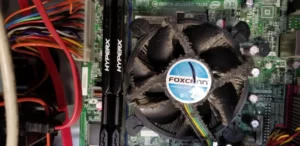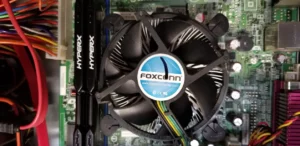Introduction
I’m someone deeply involved in the world of computers, servers, and laptops. So I’ve come to understand that the CPU (Central Processing Unit) is the brain of these machines, executing complex tasks and calculations. However, I’ve also learned ways that even the most powerful CPU can face performance degradation and potential dangers. This especially true if its cooling system, specifically the CPU fan, is not adequately maintained! In this article, I want to share my insights on the importance of cleaning your CPU fan! I’ll also highlight the potential risks associated with heat and overheating issues.
The Importance of CPU Fan Cleaning
Heat is the natural enemy of electronic components, including the CPU. As the CPU performs tasks, it generates heat, which must be efficiently dissipated to maintain optimal performance and prevent overheating. The CPU fan plays a critical role in this process by circulating air and removing heat from the CPU heatsink. However, I’ve noticed that over time, the fan can accumulate dust, debris, and other contaminants, obstructing its functionality.
Significance of Dust Removal

When dust settles on the CPU fan blades and the heatsink, it forms a layer that hampers airflow. This impedes the fan’s ability to extract heat effectively, causing the CPU to operate at higher temperatures. Overheating can lead to a myriad of problems, including reduced performance, system instability, and even permanent damage to the CPU.
Improved Heat Dissipation

By regularly cleaning your CPU fan, I’ve found that I can remove the barrier to efficient heat dissipation. The clean fan blades can spin more freely, generating a stronger airflow and ensuring that the CPU remains within safe temperature ranges. This translates into continued good performance and certainly reduced risk of overheating-related issues.
I have found that cleaning workstation’s system fans in an average office environment about every six months seems to be sufficient. In higher traffic areas I would recommend every three to four months. Laptops might be a little less as, if they are like mine, they spend more time in their case than out of it. The good news is that you can’t have your system too clean!
Preventing CPU Damage and even Fire Risk
The consequences of a poorly maintained CPU fan can be severe and costly. When a CPU operates at elevated temperatures, it tends to throttle its speed to prevent further heat buildup. This throttling reduces the CPU’s performance potential, leading to slower computations, laggy software, and an overall sluggish user experience.
Overheating can cause unexpected system crashes, shutdowns, or Blue Screen of Death (BSOD) errors. These abrupt disruptions not only interrupt work but can also result in data loss or corruption.
More alarmingly, there’s also even a risk of fire. While it’s very rare (I’ve only had it happen to a machine once since 1998), the combination of high temperatures and dust accumulation can potentially ignite a fire, posing a serious threat to your safety and property.
The cumulative effect of prolonged exposure to high temperatures can significantly impact the lifespan of a CPU. Excessive heat can degrade the CPU’s internal components, leading to premature failure. I’ve found that regularly cleaning the CPU fan and maintaining proper cooling reduces the strain on the CPU, extending its lifespan and maximizing my investment. Here is a nice summary:
-
- Throttling: When a CPU gets too hot, it can start to throttle its speed as a protective measure. This means it will intentionally slow down to reduce the heat it’s generating. This can lead to noticeable performance drops, especially in CPU-intensive tasks like gaming or video editing.
- System Instability: Overheating can cause system instability, leading to frequent crashes or freezes. This is because the CPU is unable to perform its tasks effectively at high temperatures.
- Shortened Lifespan: Consistent overheating can shorten the lifespan of the CPU. High temperatures can cause damage to the delicate circuits in the CPU over time.
- Unexpected Shutdowns: In extreme cases, the system may shut down unexpectedly to protect the CPU from heat damage. This is a last-resort measure when the CPU temperature reaches a critical level.
- Potential Data Loss: If your system is frequently crashing or shutting down unexpectedly due to overheating, there’s a risk of data loss. You might lose unsaved work, and frequent hard shutdowns can even cause corruption in your operating system or other software.
Keep it Clean!
As I’ve learned over the years, cleanliness is not only a virtue but a necessity when it comes to the longevity and performance of your computer, server, or laptop. The CPU fan plays a vital role in maintaining an optimal operating temperature, and neglecting its maintenance can have dire consequences. By prioritizing the cleaning of CPU fans, I’ve been able to enhance performance and stability and safeguard my valuable CPU from potential damage.
Remember, a clean CPU fan ensures a cool and efficient computing experience, free from the perils of easily avoided heat-induced problems.


